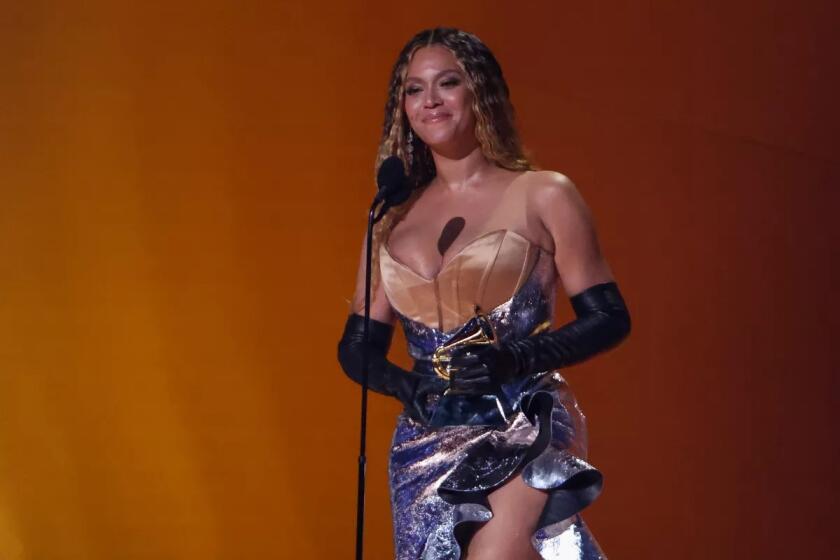Ebony and Ivory Come Together in Eminem
- Share via
African American music and its appropriation and commercial exploitation by white folks is, to a remarkable extent, the history of world popular music in the 20th and, so far, in the 21st centuries.
Consider the artists: Benny Goodman, Elvis Presley, the Beatles, the Rolling Stones, Eric Clapton, the Eurythmics. And then there are the mere exploiters: Pat Boone, Vanilla Ice, the Backstreet Boys.
Each moment in the history of pop music has been a moment in the history of race relations. But white culture has never been as self-conscious, and white use of black vernacular has never been more knowing than on “The Eminem Show”--which has dominated the market in sales since its May 28 release.
Presley never sang about his own status as a white person performing black music, but Eminem tackles the question at the start of the new album. On a song called “White America,” Eminem attributes his success to the color of his skin.
This is not entirely fair to himself, because by any measure he is one of the best rappers of any race that ever grabbed a microphone. But he’s got a point: “See the problem is I speak to suburban kids who otherwise would of never knew these words exist ... till I created so much [expletive] turbulence straight out the tube, right into your living room I came, and kids flipped.... That’s all it took, and they were instantly right in, and they connected with me too because I looked like them.”
In other words, the obsession with Eminem, by his own account, derives in part from the color of his skin, and the controversy that swirls around him derives in turn from that obsession.
As he says, suburban white kids (he calls them “Eric” and “Erica”) connect with his experience--his alienation.
His excess and his success are inseparable from the color of his skin.
The mere existence of Eminem, as that of Elvis, constitutes a self-critique of white America. In Eminem’s reading, the pale ‘burbs constitute a regime of sheer appearance, in which the surface is bland and perfect and the reality is a roiling whirlpool of pain and disaffection.
Elvis challenged white America to acknowledge its false exclusion of pleasure: dance and sex.
Eminem challenges us to acknowledge our equally false exclusion of pain.
Eminem has dedicated himself to embodying the repressed strangeness of white-bread American life: its addictions, its obsessions, its violence. Even in the cartoon scenarios that he constructs, he speaks at the deepest levels of cultural truth. Hence, he’s the overwhelming figure of the moment.
Eminem is our authority on what it means to be white in this culture, a question that is difficult, central and dangerous.
He gains his authority from his being white on the periphery of white culture, or being white in black culture. His records are produced by the great rap impresario Dr. Dre, and they speak from outside and inside white culture simultaneously.
They speak with the authority of identity because Eminem is white. But they speak at the same time with the authority of distance because they express white culture in part from a black point of view.
That’s a unique vantage, and Eminem’s artistry is to be able to express it with incomparable clarity and intensity. That’s why, like it or not, he’s our Elvis.
More to Read
The biggest entertainment stories
Get our big stories about Hollywood, film, television, music, arts, culture and more right in your inbox as soon as they publish.
You may occasionally receive promotional content from the Los Angeles Times.










